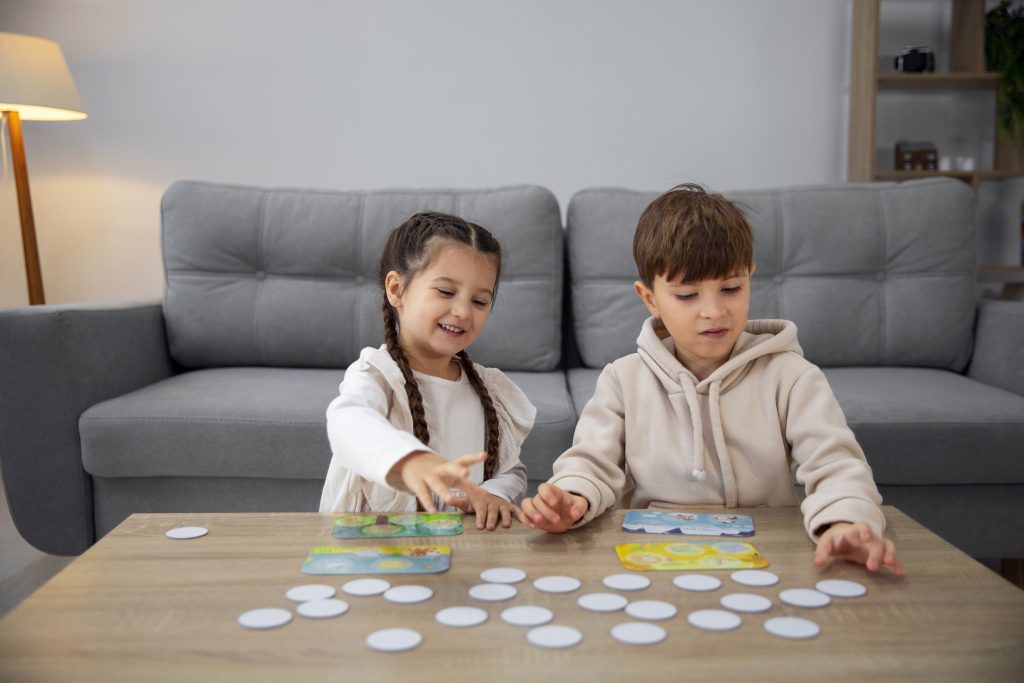Are you looking for ways to engage your child in activities that are not only fun but also contribute to their development? If so, board games might be the perfect solution. Imagine your child’s excitement as they strategize and compete, all while gaining important skills and knowledge. In this article, we will explore the various ways in which board games can positively impact your child’s growth and wellbeing. From fostering early learning and cognitive development to enhancing social skills and emotional intelligence, board games offer a wealth of benefits for your child’s overall development. But that’s not all – we will also delve into the specific advantages of popular board games such as Click Clack Lumberjack and Rhino Hero: Super Battle. So, get ready to embark on a journey through the world of board games and discover how they can benefit your child in more ways than one.
Early Learning and Cognitive Development
Board games play a crucial role in early learning and cognitive development by enhancing various skills such as color identification, counting, hand-eye coordination, critical thinking, problem-solving, memory, concentration, strategic planning, and logical reasoning. Young children benefit greatly from playing board games, as they provide a fun and interactive way to learn and develop important cognitive skills.
One of the key benefits of board games for young children is the enhancement of critical thinking skills. Through gameplay, children are encouraged to think strategically, make decisions, and solve problems. These games require players to analyze situations, consider different options, and weigh the consequences of their choices. This process helps develop their ability to think critically and make informed decisions in various aspects of life.
Furthermore, board games also play a significant role in developing hand-eye coordination. Many board games involve the use of pieces, cards, or tokens that require manipulation and precise movements. Children must coordinate their hand movements with their visual perception in order to successfully interact with the game components. This enhances their motor skills and helps them develop dexterity and control.
Brain Development and Academic Skills
Enhancing brain development and academic skills, board games provide a valuable opportunity for children to strengthen their cognitive abilities and excel in various academic areas. Here are four ways in which board games can benefit academic performance:
- The role of board games in math education: Board games often involve counting, strategizing, and making calculations, which can improve math skills. Through games, children can develop a better understanding of numbers, improve their arithmetic abilities, and enhance their problem-solving skills.
- Enhancing reading and literacy skills through board games: Many board games require reading instructions, cards, or prompts, which can help children improve their reading comprehension and vocabulary. By engaging with words and texts in a fun and interactive way, board games can foster a love for reading and strengthen literacy skills.
- Board games as a tool for developing problem-solving abilities: Board games often present players with challenges and obstacles that require critical thinking and problem-solving skills to overcome. By playing these games, children learn to analyze situations, make strategic decisions, and think creatively to solve problems.
- The impact of board games on strategic thinking skills: Strategic board games, such as chess or strategy-based games, can help children develop their strategic thinking abilities. These games require players to plan ahead, consider multiple possibilities, and make calculated moves, which can enhance their strategic thinking skills and improve their ability to analyze and solve complex problems.
Language Skills Improvement
As children engage in board games to enhance their brain development and academic skills, they also reap the benefits of improved language skills. Board games provide an interactive and enjoyable way for children to flex their spelling skills, improve reading comprehension, enhance memory skills, expand their vocabulary, and improve overall language skills.
Incorporating language development into board games can be done through various means. For example, many games require players to read instructions, cards, or game prompts, which helps improve reading comprehension. Additionally, players often have to remember information, such as rules or specific game strategies, which enhances memory skills. Furthermore, board games provide opportunities for children to learn and use new vocabulary words, expanding their linguistic repertoire.
To illustrate the language benefits of board games, here is a table showcasing how different language skills can be improved through gameplay:
| Language Skill | How It Is Improved |
|---|---|
| Flexing spelling skills | Players may need to spell words correctly |
| Improving reading comprehension | Reading game instructions or cards |
| Enhancing memory skills | Remembering rules or game strategies |
| Expanding vocabulary | Learning new words within the game context |
| Improving language skills | Engaging in conversation and verbal expression |
Social Skills and Emotional Development
Developing social skills and emotional intelligence is a crucial aspect of a child’s growth, and board games provide an engaging and interactive platform to foster these essential life skills. Here are four ways in which board games can promote social skills and emotional development:
- Promoting empathy and understanding: By playing board games, children have the opportunity to understand and relate to the experiences and perspectives of others. They learn to consider the feelings and needs of their fellow players, promoting empathy and understanding.
- Enhancing emotional regulation: Board games often involve competition and challenges, which can elicit a range of emotions. Through playing these games, children learn to regulate their emotions, managing frustration, disappointment, and excitement in a healthy and appropriate manner.
- Fostering resilience and perseverance: Board games provide a safe space for children to experience setbacks and learn how to bounce back. They develop resilience by facing challenges, adapting strategies, and persevering until they achieve their goals.
- Developing negotiation skills: Many board games require players to make decisions collectively and negotiate with others. Children learn to express their opinions, listen to others, and find fair compromises, thereby developing valuable negotiation skills.
In addition to these benefits, board games also help in building good sportsmanship, emphasizing the importance of fair play, respect for others, and graciousness in both winning and losing. By incorporating board games into a child’s routine, parents and educators can nurture their social skills and emotional development in an enjoyable and meaningful way.
Family Bonding and Life Lessons
Board games provide a unique opportunity for families to come together, bond, and learn important life lessons along the way. These games teach valuable skills such as teamwork, problem-solving, and open communication. They also create lasting memories and traditions that foster a sense of belonging and togetherness.
Take a look at the table below to see some of the life lessons that can be learned through playing board games:
| Life Lessons | Examples from Board Games |
|---|---|
| Teaching teamwork | Collaborating with family members to achieve a common goal in games like Pandemic or Forbidden Island. |
| Luck and unpredictability | Learning that luck can change and that nothing is guaranteed, as seen in games like Sorry! or Snakes and Ladders. |
| Developing problem-solving skills | Navigating challenges, strategizing, and finding solutions in games like Chess or Settlers of Catan. |
| Creating lasting memories | Laughing, cheering, and bonding over shared experiences and victories in games like Monopoly or Scrabble. |
| Promoting open communication | Engaging in discussions, negotiating, and expressing thoughts and opinions during gameplay in games like Codenames or Taboo. |
Social Benefits of Board Games
Playing board games with others can have a positive impact on your social skills and overall well-being. Here are four social benefits that board games can provide:
- Promoting Cooperation: Board games engage children in cooperation and turn-taking. They encourage teamwork and cooperation, teaching players the value of working together towards a common goal. By playing board games, children learn to collaborate and make joint decisions, fostering a sense of unity and shared responsibility.
- Building Empathy: Board games promote empathy and understanding. Through gameplay, players are exposed to different perspectives and experiences, allowing them to develop empathy towards others. They learn to consider the feelings and thoughts of their fellow players, enhancing their ability to relate and connect with others on a deeper level.
- Enhancing Communication: Board games provide opportunities for communication and conversation. Players must interact with each other, discussing strategies, making plans, and engaging in friendly banter. This encourages the development of effective communication skills, such as active listening, clear expression, and respectful dialogue.
- Strengthening Relationships: Playing board games fosters strong relationships among family members and friends. It creates shared experiences, memories, and traditions that strengthen the bonds between individuals. The collaborative nature of board games also promotes positive interactions and builds trust, leading to deeper and more meaningful connections.
Cognitive Benefits of Board Games
When it comes to board games, the social benefits are just the tip of the iceberg – the cognitive benefits are equally noteworthy. Board games offer a multitude of cognitive benefits, including improving problem-solving abilities, boosting memory and concentration, and enhancing logical reasoning skills.
Playing board games requires strategic thinking, as players must analyze the game board, predict the outcomes of their moves, and plan their next steps accordingly. This type of thinking helps develop problem-solving abilities as players learn to overcome obstacles and find solutions to challenges presented in the game.
Furthermore, board games promote memory and concentration. Players must remember the rules, the strategies they have employed, and the outcomes of previous moves. This constant mental engagement helps strengthen memory and focus.
Logical reasoning is also enhanced through board game play. Players learn to think critically, analyze information, and make sound decisions based on the information available to them. This type of reasoning is essential in many real-life situations and academic subjects.
Board Games and ADHD Symptoms
Abstract strategy games like Chess or Go have been shown to improve attention in children with ADHD by activating the frontal brain region responsible for regulating attention. This finding suggests that board games can be an effective tool in managing symptoms associated with ADHD. Here are the benefits of board games for children with ADHD:
- Improved attention: Abstract strategy games engage the frontal brain region, enhancing attention and focus in children with ADHD.
- Structured activity: Board games provide a structured and engaging activity that can help children with ADHD stay organized and focused.
- Enhanced functioning: Playing board games can improve functioning in attention, behavior, and emotion, helping children with ADHD navigate daily challenges.
- Managing symptoms: Abstract strategy games offer a valuable tool in managing symptoms associated with ADHD, promoting better self-regulation and impulse control.















